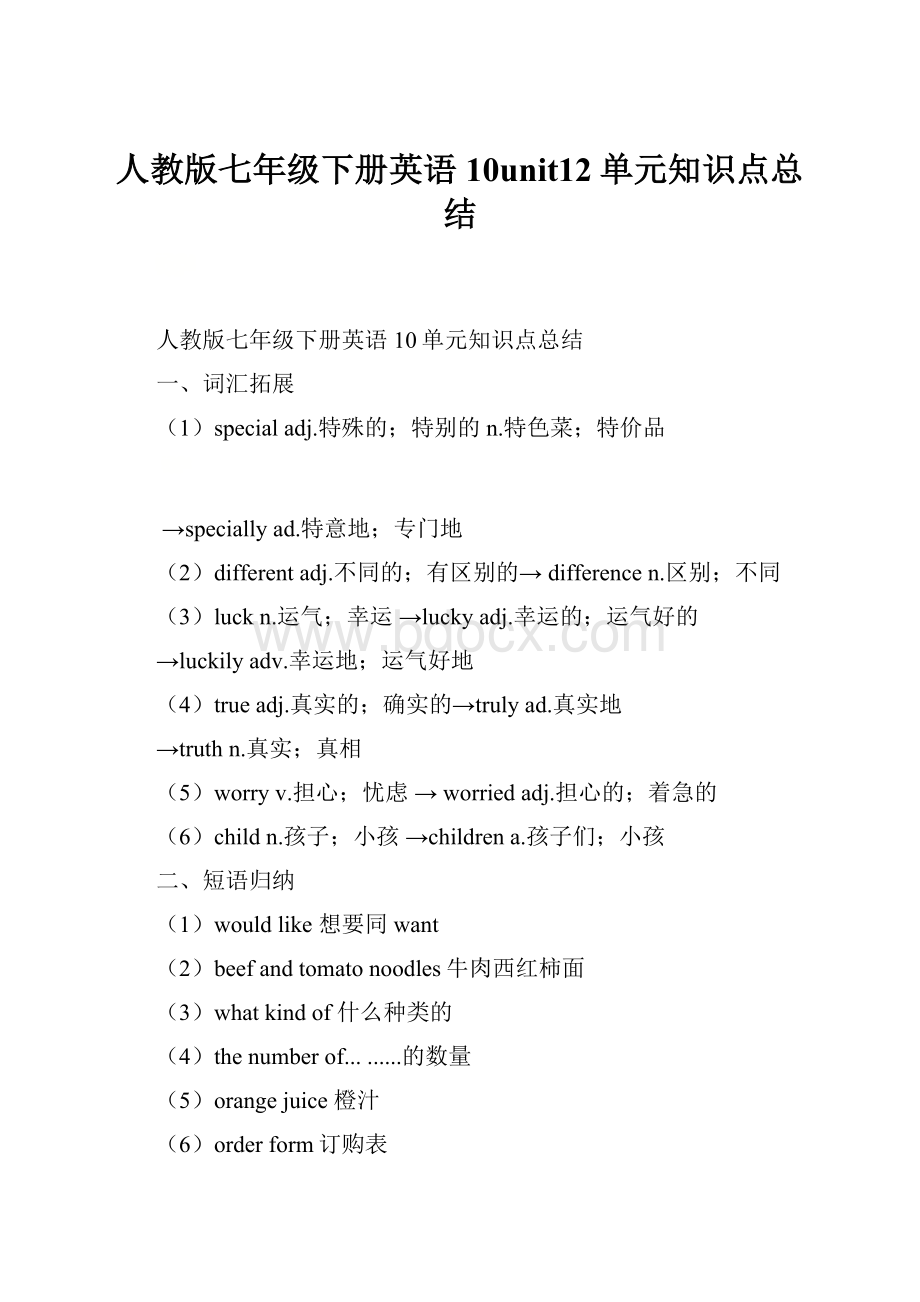人教版七年级下册英语10unit12单元知识点总结.docx
《人教版七年级下册英语10unit12单元知识点总结.docx》由会员分享,可在线阅读,更多相关《人教版七年级下册英语10unit12单元知识点总结.docx(56页珍藏版)》请在冰豆网上搜索。

人教版七年级下册英语10unit12单元知识点总结
人教版七年级下册英语10单元知识点总结
一、词汇拓展
(1)specialadj.特殊的;特别的n.特色菜;特价品
→speciallyad.特意地;专门地
(2)differentadj.不同的;有区别的→differencen.区别;不同
(3)luckn.运气;幸运→luckyadj.幸运的;运气好的
→luckilyadv.幸运地;运气好地
(4)trueadj.真实的;确实的→trulyad.真实地
→truthn.真实;真相
(5)worryv.担心;忧虑→worriedadj.担心的;着急的
(6)childn.孩子;小孩→childrena.孩子们;小孩
二、短语归纳
(1)wouldlike想要同want
(2)beefandtomatonoodles牛肉西红柿面
(3)whatkindof什么种类的
(4)thenumberof.........的数量
(5)orangejuice橙汁
(6)orderform订购表
(7)fourbowlsof四碗.……
(8)makeawish许一个愿
(9)cometrue实现;或为现实
(10)blowout吹灭
(11)cutup切碎;切断
(12)beshortof缺少;短缺
(13)bepopularwith受到……欢迎
(14)allof..……中的全部
(15)inonego一次,一口气同atatime
(16)CanIhelpyou?
你要点什么吗?
同WhatcanIforyou?
(17).MayItakeyourorder?
我可以给你点菜吗?
(18)alarge/bigbowlof...一大碗......
(19)whatsizebowlof...多大号碗的
三、知识点fish
(1)fish既可作可数名词,也可以作不可数名词。
用作可数名词指鱼的条数时,单复数相同。
例如:
Iboughttwofishinthemarket.
(2)fish用作可数名词指鱼的种类时,复数形式是fishes.
例如:
Therearemanykindsoffishesinthelake.
(3)fish作不可数名词,意为“鱼肉”。
Doyoulikefishoreggs?
你喜欢吃鱼肉还是鸡蛋?
(4)fish还可以作动词,意为“钓鱼”。
Let’sgofishingtomorrow.让我们明天去钓鱼吧。
四、知识点special
(1)special作名词时,意为“特色菜、特价品、特别的事物”等。
例如:
Thetrainisaspecialforthefootballgame.
Themenuchangesregularlyandtherearedailyspecialstochoosefrom.
(2)special还可以做形容词,意为“特殊的,特别的,特色的”。
Hisaccentisquitespecial.
五、知识点order
(1)order作名词,意为“点菜”,是可数名词;词组takeone’sorder意为“点菜”。
例如:
MayItakeyourorder?
拓展:
order作名词时,还可以表示“顺序、次序”。
例如:
Thenamesareinalphabeticalorder.
Mymotherlikesorderinourhome.
(2)order作动词,意为“命令、要求、订购货物”等。
例如:
Thepoliceorderedthemtowaitrightthere.
ShallIorderataxiforyou?
六、知识点
wouldlike+sth./todosth./sb.todosth想/想要/愿意…=wanttodosth.
---Whatwouldyouliketodrink?
---I’dlikeacupoftea.
Shewouldn’tliketodothat.
I’dlikeyoutogotherewithme.
七、知识点blow
blow不及物动词,意为“吹”;词组blowout意为“吹灭”。
后接名词时,名词可以放在词组的中间也可以放在out的后面;后接代词时,代词必须放在词组的中间。
例如:
Thewindblewoutthecandle.风吹灭了蜡烛。
Thewindblewthematchout.风把火柴吹灭了。
Thewindblewitout.风把它吹灭了。
八、知识点
makesb./sth.dosth.意为“使某人做某事”。
makesth/sb+adj意为“使/让某人(某物)怎么样”。
例如:
Thebossmakesusworkelevenhoursaday.
Sheoftenmakeshimhappy.
九、知识点
anumberof表示“许多……”+名词复数+谓语动词复数
Anumberofstudentsofourschoolhavereadthatmagazine.
Anumberofwildanimalshavebeenfoundintheforest.
thenumberof表示“……的数量”+名词复数+谓语动词单数。
Thenumberofstudentsinourschoolis1,500.
十、知识点
whatsize询问尺寸、大小,“多大尺寸,什么号码的”。
size是名词,可以表示物品的大小、尺寸、号码。
1)---你要多大号码的鞋?
---我要38码的。
---Whatsizeshoeswouldyoulike?
---I’dlikeSize38.
2)这件T恤有点小,你能给我一件大号的吗?
ThisT-shirtisalittlesmallforme.Wouldyouliketoshowmealargersize?
十一、知识点语法:
名词复数的变化规律
一、名词复数的构成方法及读音规则
1.一般情况加–s:
例如:
map—maps;drink—drinks;roof—roofs;park—parks;
例如:
boy—boys;show—shows;zoo—zoos;
panda—pandas;car—cars;singer—singers;
例如:
girl—girls;pen—pens;friend—friends;bag—bags;lab—labs;room—rooms;
2.以s,sh,ch,x等结尾加–es,如:
bus—buseswatch—watchesbox—boxesbrush—brushes
match—matchesfish—fishes
3.以辅音字母+y结尾,变y为i,再加es。
例如:
baby—babies;strawberry—strawberriescountry—countries;story—storiesfamily—families;city—cities
但以y结尾的专有名词,或元音字母+y结尾的名词变复数时,直接加s变复数。
twoMarys theHenrys
boy—boys;monkey—monkeys;
play—plays;holiday—holidays
4.以o结尾的名词,变复数时:
1)无生命的加s,如:
photo---photos,zoo---zoospiano---pianos,radio---radios;
2)有生命的加es,如:
potato---potatoes,tomato---tomatoes,hero---heroes(英雄),
5.以f或fe结尾的名词变复数时:
1)加s,如:
belief---beliefs(信仰,信任) roof---roofs(房顶)
scarf---scarfs/scarves(围巾)
2)去f,fe加ves,如:
half---halves(半)knife---knivesleaf---leaves wolf---wolves
wife---wives life---lives(生命) thief---thievesshelf---shelves(架子)
self---selves(自己)
二、名词复数的不规则变化
1.child---children, foot---feet, tooth---teeth,goose---geese(鹅),
mouse---mice(小老鼠), man---men, woman---women,
注意:
由一个词加man或woman构成的合成词,其复数形式也是-men和-women。
anEnglishman--twoEnglishmen。
但German不是合成词,所以复数形式为Germans.
2.单复同形。
如:
deer鹿, sheep绵羊Chinese---Chinese;Japanese---Japanese
3.集体名词,以单数形式出现,但实为复数。
people police cattle等本身就是复数,不能说apeople(一个人),apolice,acattle;(但是可以有:
apeople:
一个民族)
但在表达“一个…”时,可以说aperson,apoliceman,aheadofcattle.
4.以s结尾,仍为单数的名词,如:
1)maths(英:
数学),politics(政治),physics(物理)等学科名词,虽然后有-s,但是为单数形式。
2)news为不可数名词。
3)theUnitedStates,theUnitedNations视为单数。
4)以复数形式出现的书名,剧名,报纸,杂志名,也可视为单数。
例
5.表示由两部分构成的东西,只有复数形式。
glasses;trousers;pants;shorts;shoes; compasses(圆规)scissors(剪刀)等,若表达具体数目,要借助数量词pair(对,双);suit(套)。
apairofglasses“一副眼镜”;
twopairsoftrousers“两条裤子”等。
6.另外还有一些名词,其复数形式有时可表示特别意思。
如:
goods货物,waters水域,fishes(各种)鱼。
三、表示“某国人”的单复数变化:
1.加-s的词:
German---Germans(德国人)
Russian---Russians(俄罗斯人)
Roman---Romans(罗马人)
American---Americans
Arab---Arabs(阿拉伯人)
2.有变化的词有:
Frenchman---Frenchmen;Englishman-Englishmen
四、合成名词变为复数时:
1.第一个或最后一个词变成复数。
girlfriend---girlfriends(女朋友)
boystudent---boystudents(男学生)
grown-up---grown-ups(成年人)
passer-by---passers-by(过路人)
son-in-law---sons-in-law(女婿)
2.构成合成名词的两个词都要变为复数。
manservant---menservants(男仆人) womanteacher---womenteachers
mandoctor---mendoctors
可数名词和不可数名词
①本单元的可数名词:
eggs,apples,strawberries,oranges,onions,dumplings,drinks,carrots,
②本单元的不可数名词:
rice,porridge,beef,mutton,broccoli,juice
③本单元的既是可数又是不可数的名词;chicken,salad,icecream,cabbage,soup,dessert,fish
一、用所给词的适当形式填空
1.Manychildrenliketoeat__candies______(candy).
2.Heisso__lucky______(luck)thistime.Hegetstheticket.
3.Thewindis__blowing______(blow)heavily.It'sgoingtorain.
4.I'dliketwo__cups______(cup)ofgreentea.
5.There__is______(be)somebeefandtomatoesinthenoodles,doyoulikethenoodleswithbeefand__tomatoes______(tomato)?
6.Theywouldlike__tosee_______(see)theanimalsinthezoo.
7.Letthem____help________(help)uswithEnglish.
8.Wouldyoulikesomejuice_todrink____(drink)?
9.Therearesome__tomatoes__(tomato)and_porridge_(porridge)onthetable.
10.Whatabout_swimming_(swim)inthepool?
二、单项选择
(C)1.---Wouldyoulikesomethingtoeat?
---_______.I’mnothungry.
A.Yes,I’dliketoB.Yes,I’dlovetoC.No,thanks
(A)2.---_______?
---I’dlikeacupoftea.
A.WouldyoulikesometeaB.CanyouhelpmeC.Doyouliketea
(B)3.---Doyouwantabigwatermelon(西瓜)ora_______one?
---Abigone,please.
A.thinB.smallC.heavy
(B)4.Heistoohungryandhewantstwo_______.
A.bowlofnoodlesB.bowlsofnoodlesC.bowlsofnoodle
(A)5.---What_______coatwouldyoulike?
---Amediumone.
A.sizeB.kindC.color
(C)6.---Let’sdosomethingattheparty.Whatabout_______?
---No,I’dlike_______.
A.tosing;todanceB.tosing;dancingC.singing;todance
(B)7.---Wouldyoulikegreentea_______juice?
---Idon’tlikegreentea_______juice.
A.and;andB.or;orC.and;or
(C)8.Look!
Somechicken_______ontheplate.Andsomeeggs_______inthebowl.
A.is;isB.are;areC.is;are
(A)9.Iofteneatsome_______and_______onSundayevenings.
A.tomatoes;fishB.tomato;fishC.tomatoes;fishes
(C)10.---Whatsizepizza_______Lilylike?
---She_____likealargepizza.
A.does;isB.is;wouldC.would;would
(D)11.---Whatsizepizzawouldyoulike,smallormedium?
---__________.
A.Small,pleaseB.Medium,pleaseC.Sorry,Idon’tknowD.BothAandB
(C)12.---CanIhelpyou?
---I’dliketodrink______.
A.someorangesB.orangesC.someorangeD.orangejuices
(C)13.He’dlikeme_________him_________English.
A.help,learnB.help,learningC.tohelp,learnD.tohelplearning
(B)14.Ican’tgowithyoubecauseIhave_________todo.
A.manyhomeworkB.muchhomework
C.alothomeworkD.alotofhomeworks
(C)15.______youlike______toeat?
A.Are,somethingB.Are,anything
C.Would,somethingD.Would,anything
(D)16.I’mhungry.Iwouldlike________alargebowlofdumplings.
A.haveB.eatC.eatingD.toeat
(D)17.Wouldyouliketogoshoppingwithme?
__________.
A.No,Iwouldn’tB.Yes,IwouldC.Yes,I’dloveD.Yes,I’dloveto
(A)18.Myfather’sideasarequitedifferent mine,butIdon’twanttolistentohim.
A.from B.as C.with D.for
(B)19.—Whoisyourfavoritesinger,Mike?
—TFBOYS.Theyarevery boysandgirls.
A.proudofB.popularwithC.strictwithD.worriedabout
(C)20.—Howmanywomendoctorsarethereinyourhospital?
— them overtwenty.
A.numberof;areB.Thenumberof;are
C.Thenumberof;isD.Anumberof;is
(A)21. there muttonandvegetablesinthenoodles?
A.Is;anyB.Is;someC.Are;anyD.Are;some
(A)22..—WouldyouliketohelpmewithmyEnglishthisevening?
— .I’mbusythisevening.Whatabouttomorrowmorning?
A.I’msorryB.Idon’tthinksoC.NoproblemD.Soundslikeagoodidea
(C)23.Thenumberofpeopleinthecity aboutsevenmillionnow.
A.are B.has C.isD.have
(D)24.—Wouldyouliketoseeamoviewithmetonight?
— .Ihavetodochores.
A.GoodluckB.Let’sgoC.NoproblemD.I’mafraidnot
(B)25.—Look!
There sometomatoesinthebasket. —Oh,howfresh!
A.is B.are C.was D.were
(B)26.—Isthere juiceintheglass?
—Yes,thereis .
A.some;anyB.any;someC.some;someD.any;any
(A)27.—Wouldyoulikesomewater?
— .Iamthirstynow.
A.Yes,please.B.Great.I’llgetit.C.Sorry,Iwouldn’t.D.No,thankyou.
(B)28.Juliewouldlike TV.
A.watchB.towatch C.watching D.watches
(A)29.Weneedtogoshopping.Thereis juiceleftinthefridge.
A.littl